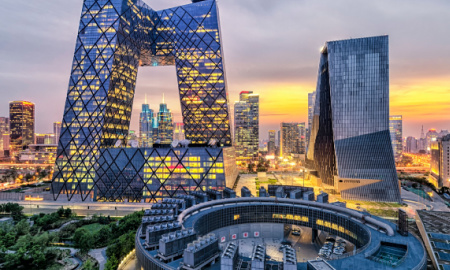Sign up for our free daily newsletter
YOUR PRIVACY - PLEASE READ CAREFULLY DATA PROTECTION STATEMENT
Below we explain how we will communicate with you. We set out how we use your data in our Privacy Policy.
Global City Media, and its associated brands will use the lawful basis of legitimate interests to use
the
contact details you have supplied to contact you regarding our publications, events, training,
reader
research, and other relevant information. We will always give you the option to opt out of our
marketing.
By clicking submit, you confirm that you understand and accept the Terms & Conditions and Privacy Policy
China continues to be a key market for luxury brands. Chinese consumers are expected to spend increasing amounts on luxury goods and services following the Chinese government’s recent loosening of strict pandemic control measures. Several recent changes have affected how brands are now able to engage in promotional and marketing activities. When implementing marketing campaigns in China, brands should take these important developments into account.
Heightened scrutiny and regulation on celebrity endorsement activities
Celebrity endorsement activities have become an increasing priority for Chinese regulators, culminating in seven Chinese government agencies jointly issuing ‘Guidelines to Further Regulate Celebrity Endorsement Activities’ in October 2022. Article 38 of the PRC Advertising Law already contains some major requirements including: endorsers should endorse products or services based on facts and in compliance with the law and should not endorse if they have never used the subject products or services. In addition, minors below the age of 10 should not be engaged as endorsers. Anyone subject to administrative penalties for making endorsements or testimonials in a false advertisement will be prohibited from endorsing for three years.
The new guidelines strengthen regulation by further elaborating on existing provisions, including:
- Enterprises should provide the relevant advertising scripts to the celebrity endorser and be responsible for ensuring that the content is valid and legally compliant.
- “Extravagance, money worship and hedonistic lifestyle” should not be promoted.
- Products provided to the endorser to use should be consistent with those for consumers in respect of quality, price, terms and conditions and service quality. The endorser should use the product fully and the duration or amount of use should constitute a normal daily consumption experience. During the endorsement period, the endorser should continue to use the product with reasonable frequency. In relation to products with different generations (such as cars and electronic products), an endorser who has only used one specific generation of a product cannot endorse other generations of the product. Where an endorser is a general brand ambassador, the advertisement should specify the name of the specific product used by the endorser.
- Enterprises should fully understand the celebrity’s practices and personal credit history before selecting the celebrity endorser and should proactively not work with celebrities with “illegal or immoral misconduct,” including, for example, those who have published inappropriate political speeches.
The guidelines send a clear message that the authorities are closely scrutinising celebrity endorsement activities. Brands should ensure that all endorsement activities are thoroughly vetted for compliance with Chinese law. Additionally, brands should make sure that endorsement contracts contain suitable warranties, indemnities and termination mechanisms to mitigate any adverse impacts in case the endorser is personally subject to any regulatory scrutiny in China.
Controversies on references to Chinese culture
It is common for foreign luxury brands to incorporate Chinese elements in their promotional campaigns to localise products and to cater to the Chinese market. However, luxury brands need to be sensitive when incorporating references to Chinese culture. Use of stereotypes has in many instances offended Chinese consumers and lack of appropriate credits can be perceived as cultural appropriation. In contrast, campaigns which pay tribute to and show genuine appreciation of Chinese culture are often successful in garnering popularity among Chinese consumers. Brands should carefully review promotional materials containing cultural references, in particular from a local perspective. Where any Chinese element is embedded, these should show a genuine understanding of and respect for Chinese culture.
Possible clarification on using superlative adjectives
Advertisers have historically not been permitted to use superlatives in advertising copy, a restriction which limited the ability of advertisers to describe their products in a laudatory way. China’s State Administration for Market Regulation recently issued draft ‘Enforcement Guidelines on the Use of Superlative Adjectives’. If enacted, the guidelines would clarify when brands can use superlative adjectives without violating restrictions on the use of superlatives.
These would allow superlatives where they: (1) are not directed at the promoted products but to solely indicate the operator’s service attitude, business vision, corporate culture and the pursuit of business or product goals and (2) are used under specified circumstances to refer to products promoted provided that such use does not have the objective effect of misleading consumers or disparaging other businesses. For example, for self-comparison of products within the same brand or same enterprise where the content is authentic.
The guidelines also mentioned possible lighter administrative penalties for certain cases or even no administrative penalties for first time violators where the harm done is minor and rectified in a timely manner. This is a positive development, but brands should closely monitor the draft guidelines to see the final implemented version.
As these developments show, when formulating a successful advertising and marketing strategy, luxury brands must understand the evolving legal landscape as well as China’s changing social, political and economic conditions.
Edward Chatterton is Partner and Co-Head of the Intellectual Property and Technology Practice (Asia) and Jane J. Li is a senior associate at DLA Piper Hong Kong. They advise on all aspects of intellectual property law including trademarks, copyright, patents, advertising, brand protection, trade secrets, database rights and designs. They can be reached at [email protected] and [email protected].
Email your news and story ideas to: [email protected]












